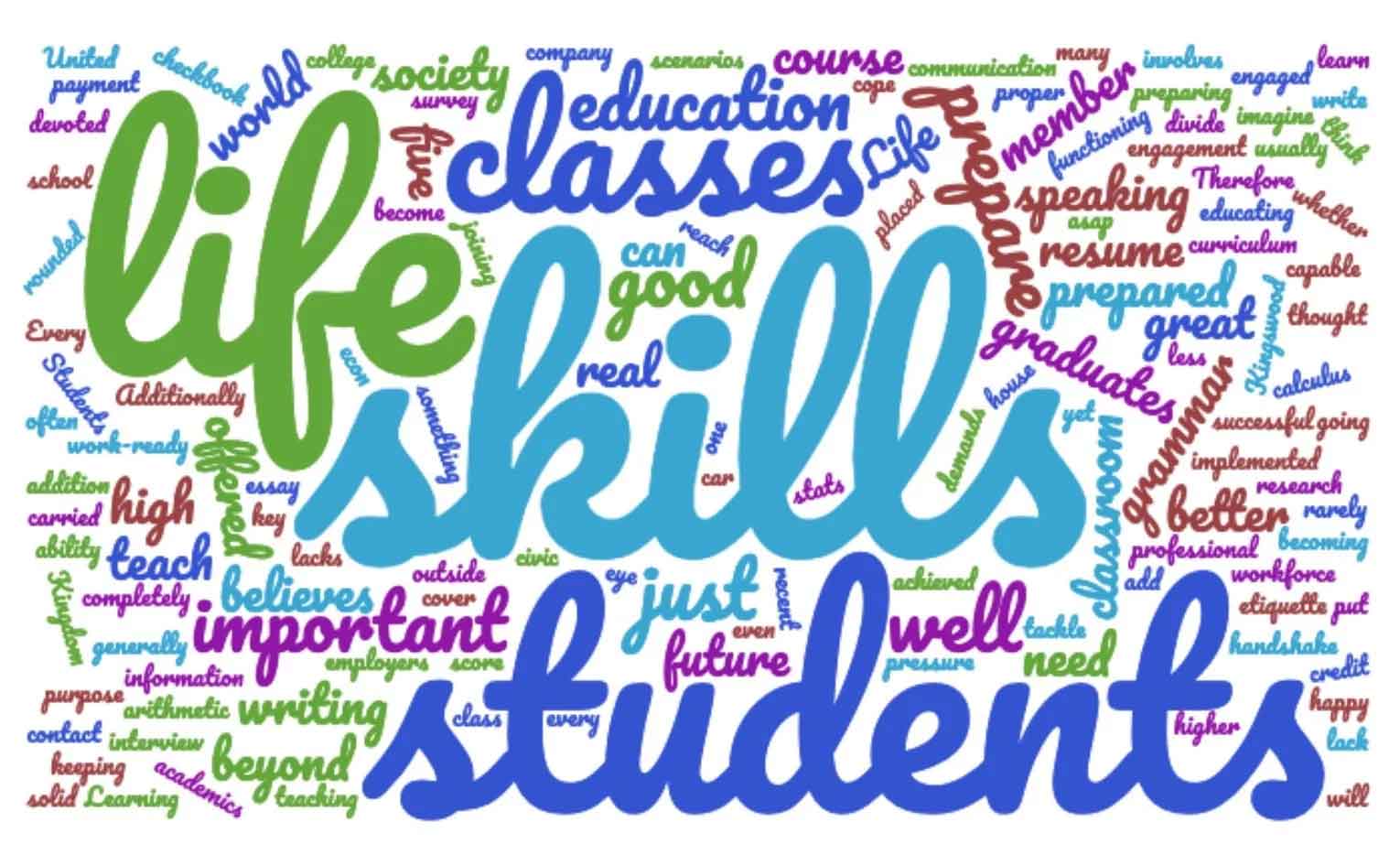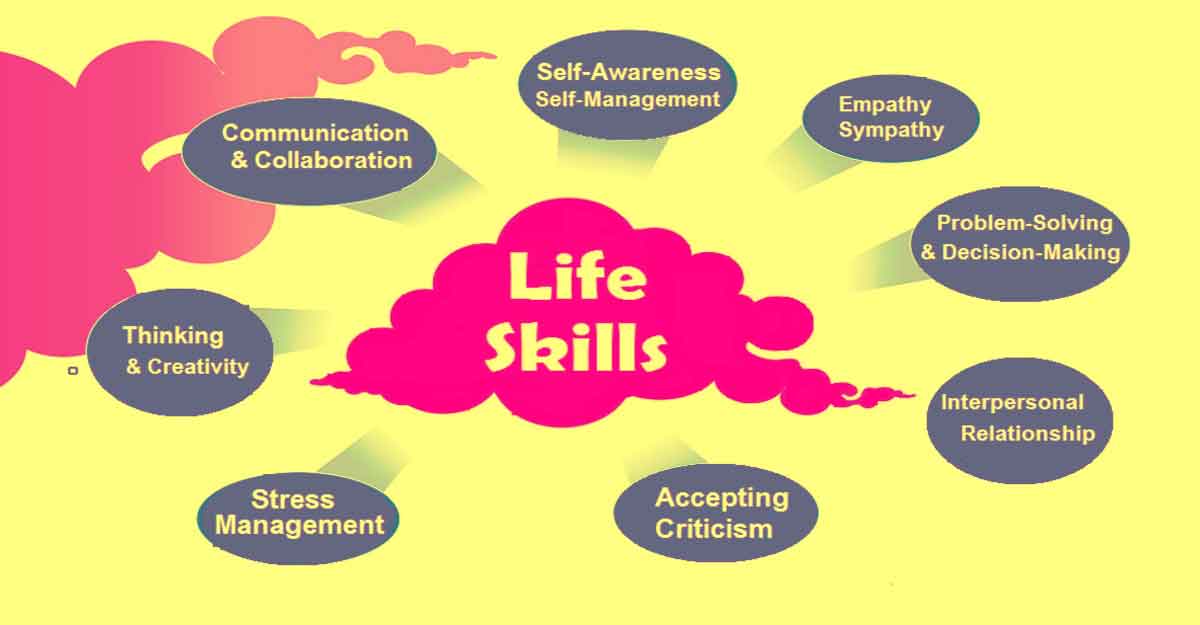In a constantly changing environment, having life skills is an essential part of being able to meet the challenges of everyday life. The dramatic changes in global economies over the past few years have been matched with the transformation in technology and these are all impacting education, the workplace, and our home life. To cope with the increasing pace and change of modern life, students need life skills to survive in the ever-growing competition of the world. The time in which we live is hectic and forces people to their professional growth and development of their skills. Today’s students will have many new jobs throughout their lives, with associated pressures and the need for flexibility.
What Are Life Skills?
A set of basic rules that are gained through learning or with direct experiences in life are termed Life Skills. These skills enable groups and individuals to tackle various sorts of issues and problems effectively which are commonly faced in daily life. They are the abilities for adaptive and positive behavior that enables students to deal with every life and career challenges situations effectively. Life skills are also defined as a set of psychosocial competence and personal skills that help people make carefully big decisions, communicate effectively with others, develop coping skills with surrounding circumstances, and manage oneself that leads to progress and success. Life skills are the capabilities that enable individuals to take adaptive and positive behavior that makes them able to deal with the events and challenges of everyday life and to participate in the modern world full of new challenges and handle everything from interactions with others to identifying and processing emotions.
Life skills are the set of personal skills and social features that the individual needs in order to interact confidently and efficiently with themselves or with other people and with the local community and in order to have a high ability to make important decisions in his life, solve problems at all levels of personal, social, sexual and self-development, in order to deal with others positively, and avoid falling into crises, and overcome them when they occur.
Importance Of Life Skills Education
The importance of having life skills in a person's life lies in his ability to adapt to all circumstances and succeed in the renaissance and prosperity of society. One of the most important problems that demand quick attention and solutions these days is the lack of life skills for the new generation. This is because there is a lack of life skills in the output of educational institutions. As a result, many fail in their careers and personal lives due to the absence of these skills they must have. Life skills education helps students build confidence in both communication and cooperative and collaborative skills, provides them with tools important for development, finds new ways of thinking and problem-solving and provides methods on how to socialize, make new friends and recognize the impact of their actions and behavior.
Current 21st-century literature indicates that our future citizens need to be multi-literate, creative, and innovative. Writing, speaking, and computing are just a few of the necessary skills for students. Leadership skills, cooperation techniques, and analysis are also important ingredients for student success. Confidence in speaking, discussion, debate, writing, and problem-solving provides a good start to providing a foundation for acquiring the skills.
Role Of Educational Institutions In Helping Students Learn Life Skills
School curriculum should incorporate strategies that require higher-level thinking skills such as inference, prediction, analysis, and critical thinking. With the use of critical thinking strategies, students develop skills such as reasoning, questioning and investigating, observing and describing, comparing and connecting, finding complexity, and exploring viewpoints. Problem-solving is an important element of all content areas. The elementary years are a time when students begin to develop their academic self-concepts and their feelings of competence and confidence as learners. They are beginning to develop decision making communication and life skills as well as character values. The knowledge, attitudes, and skills that students acquire in the areas of academic, career, and personal/social development during these elementary years serve as the foundation for future success in their school and community and prepare them to be effective global citizens.
It is important that children should be taught to access information and activate prior information. Teachers should assist students in making personal connections and making meaning of the new material and integrating this learning with what they already know. Facilitating the transfer of knowledge and skills to real-life situations is important. Children should be encouraged to think and ask questions when they don’t understand. Developing personal goals and assisting them in the achievement of these goals. Teaching and instilling the value of routines and schedules and the importance of following them. Teaching students to work cooperatively, reflect on their classroom experiences and share them with peers’ teachers and parents.
Why A Skills-Based Approach?
Traditionally, the main approach to health and life skill education has been knowledge-based. This means just giving children the facts and information about, for example, the effects and dangers of misusing drugs or the biological parts of the reproductive system. The skills-based approach, exploring attitudes and values and developing certain psycho-social competencies, is set alongside the knowledge component. The emphasis is on helping children to develop the personal and social skills they need to keep themselves safe and become responsible and independent adults.
Benefits To The Individual
In everyday life, the development of life skills helps students to find new ways of thinking and problem-solving. Knowing life skills will also help them to recognize the impact of their actions and teaches them to take responsibility for what they do. It’ll also help students in building confidence both in spoken skills and for group collaboration and cooperation which will greatly help them in decision-making processes. Students will also gain the capacity to self-manage, tackle issues while understanding individual responsibilities. Students will have the ability to adapt quickly as a result of learning these life skills. They’ll have no problem adjusting to a new working environment which will greatly benefit their careers. Life skills will also help the students to prepare themselves for upcoming challenges, difficult situations as well as opportunities in their later life.
Benefits For Society As A Whole
The more we develop life skills individually, the more these benefit the world in which we live by recognizing cultural awareness and citizenship makes international cooperation easier with people of other societies and by respecting diversity to allow creativity and imagination to flourish a more developed society. Vocational & life skills need to be encouraged. These factors are the reason that developing countries like Pakistan should invest in skill development for youth with proper education. Respecting diversity allows creativity and imagination to flourish developing a more tolerant society.
Better Perspective
Moreover, Having learned a few of the essential life skills, the children gain confidence, responsibility, and empathy towards others. With such traits, they will always have a better perspective according to the situations they are in. Thus, With the right perspective, they can act on their own with good decision-making skills, without their parent’s help.
Lifelong learning And Personal Development
There are so many important life skills, but it is also important to remember that you have been developing these skills since you were born. Continuing to learn and grow is only an ongoing part of that process.
Key Takeaway Points
Life skills depend on a large part of our experiences and how we can transfer this experience to our new generations, to learn, preach and provide additional information to their knowledge. But now we are facing a rapid change boom and a massive revolution in the field of science and technology, which widens the gap between parents and children, especially concerning learning and transferring experience to them, and achieving the maximum benefit. It is necessary for parents to experience the pressures faced by children and young people. They should not put additional pressure on them and not be surprised by their behavior that may not coincide with their values, but rather they must understand the technical development and the modern time in which they live and coexist. They should understand the pressures and challenges the children are going through, and seek to find common solutions.
By learning new skills, we increase our understanding of the world around us and equip ourselves with the tools we need to live a more productive and fulfilling life, finding ways to cope with the challenges that life, inevitably, throws at us. Most people associate learning with formal education, but learning can, and should, be a lifelong process that enhances our understanding of the world and improves the quality of our life.
Mehran Ali








.gif)




































